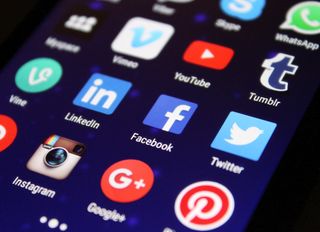Media
Social Media in a Pandemic: The Good News and the Bad News
Most of us are spending a lot more time on social media these days.
Posted April 19, 2020

Many of us are spending hours a day consuming coverage of the COVID-19 pandemic. What’s the current death rate in my state? What’s the latest extension of stay-at-home orders? What’s the latest recommendation on whether I should wear a mask to go to the grocery store?
But exposure to this level of coverage can lead to serious consequences. How? It activates the fight-or-flight stress response, leading to physiological arousal, and, over time, serious wear-and-tear on virtually all body systems.
People who watched several hours of coverage in the days following the 9/11 attack were more likely to develop physical health problems two to three years later than those with less exposure. Not surprisingly, this stress response — and resulting problems — increase with more exposure. People who watched lots of media coverage of the 2013 Boston Marathon bombings — defined as six or more hours a day — were nine times more likely to report experiencing high stress than those who watched fewer than one hour a day. These findings demonstrate that cataclysmic events — and the current pandemic certainly counts — may lead to stress even among people who aren’t directly affected.
Spending time on social media can also lead us to compare what we see of other people's lives to our own lives, and that can make us feel worse. But we often fail to remember that these images are what people s choose to present, and may well not be an accurate portrayal of their actual lives.
As economist Seth Stephens-Davidowitz points out, people spend six times as much time washing dishes as they do golf, yet there are roughly twice as many tweets about golfing as there are about doing the dishes. Similarly, although the budget Las Vegas hotel Circus Circus and the luxury hotel Bellagio have an approximately equal number of rooms, people report checking into the Bellagio hotel on Facebook about three times as often.
This same dichotomy may be seen during this pandemic, in which some people consistently post glowing reports of how well they are doing: cooking nutritious homemade meals, playing board games with their families, reorganizing the linen closet, and reading the latest bestseller. They may not choose to post about the times they spent hours watching mindless sitcoms, or eating tremendous amounts of chips and salsa, or washing their sheets and comforter after the dog peed on the bed (all true examples of things that occurred in my life over the last week).
But it's important to remember that social media can also do tremendous good during these unprecedented times. First, we all need connections during this time — and spending time on social media can help us feel closer to family and friends we can't see in person these days. Over the last few weeks, I've enjoyed seeing my husband and brother share photos of their attempts at cutting their own hair, learning how my colleagues are managing the challenges of online teaching, and even connecting with my own former students on Instagram. These opportunities to share help us feel less isolated and alone.
Second, social media can help us find connections to others who share the distinct challenges some people are facing these days, whether that's trying to stay sober while home alone all day or coping with the death of a loved one. This type of support is especially important for those who are trying to cope with serious trauma.
Researchers in one study assessed how survivors responded to the 2007 mass shooting at Virginia Tech, in which 33 people died. Although some students, as expected, showed higher levels of depression and anxiety over the next year, others didn’t show a big change in their overall mood state, for better or for worse. But the most remarkable finding was that some students actually felt better in the year after experiencing this tragedy. In fact, students who sought out social support from and developed stronger connections with other students showed decreases in anxiety and depression. Thus, even in the case of truly devastating events, people who make connections with others experience substantial benefits.


